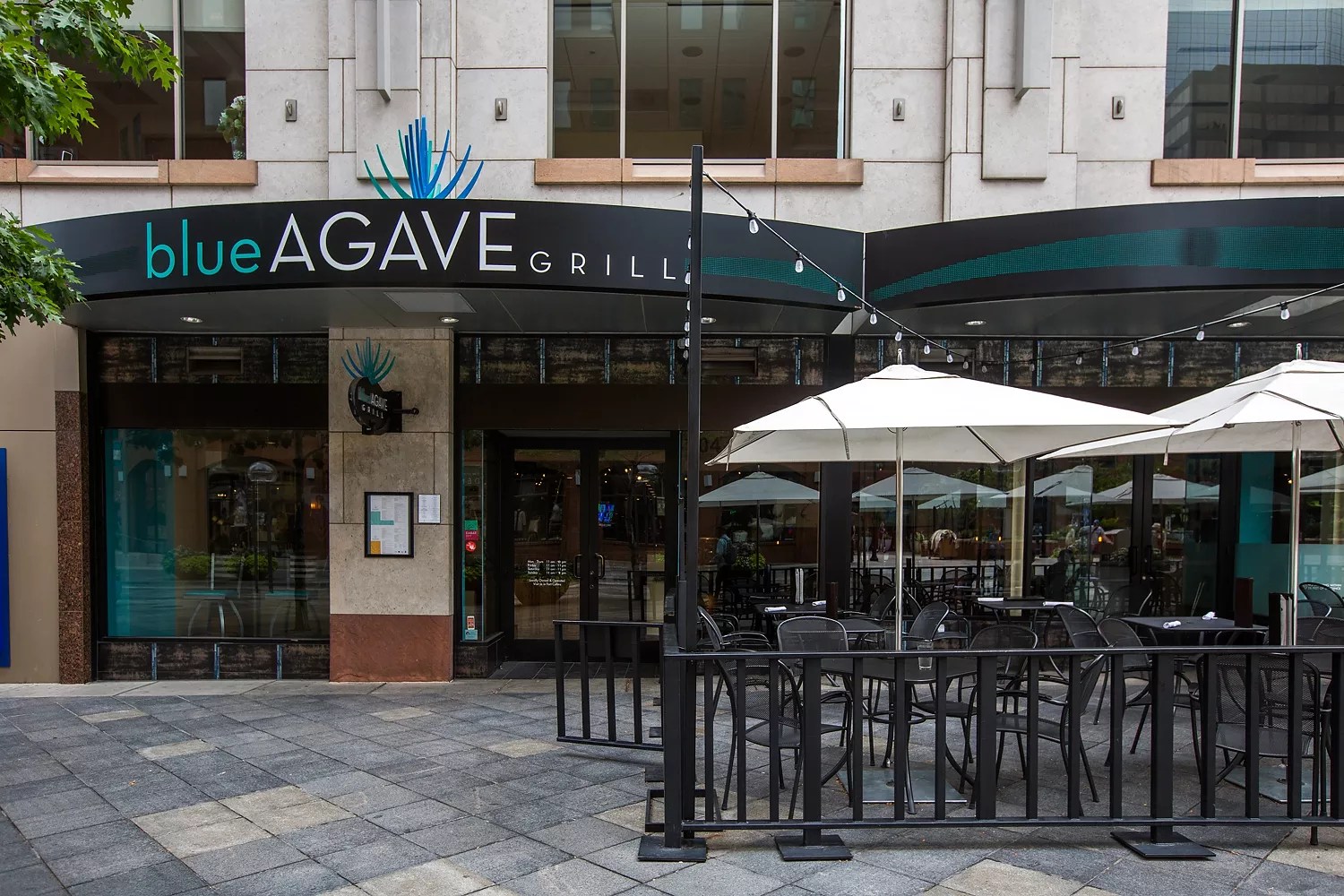
Danielle Lirette

Audio By Carbonatix
Rob Duran, regional manager of the Blue Agave Grill, at 1201 16th Street, says that business has been difficult since construction started on the 16th Street Mall in May.
And that was after COVID had already created an incredibly challenging environment: The office vacancy rate in the Central Business District was at 25 percent in early 2022. And then came construction.
“Our walk-in business has dramatically decreased,” Duran says. “The comfortability of walking between construction fence and the facades of our business is not a welcoming environment. Especially with transients or tourists in general, they see construction fences and they turn around and go to the open street area.”
Blue Agave Grill lost its patio season over the summer, and with construction continuing next year, it will have another patio-free summer in 2023. The restaurant usually does its hiring for the peak summer season in the spring, but with revenue so uncertain, it opted to extend the hours of its employees rather than hire more this year.
It also applied for the Downtown Denver Partnership’s small-business support grant program, designed to help enterprises hit hard by construction. Blue Agave Grill received $17,000 to help with marketing and other costs.
In April, Denver City Council approved giving $3 million from the city’s general fund to the DDP to help businesses impacted by the 16th Street Mall construction. Eight businesses – Sportsfan, GG Nails, Menya Noodle Bar, Kilwin’s Chocolate, Irish Rose Drafts, Brooklyn’s Fine Pizza and Blue Agave – have received funding so far, according to Sarah Wiebenson, the DDP’s director of economic development, with more grants pending. But there’s definitely room for more to apply.
The money is going to businesses impacted by mall construction in the form of mitigation and stabilization grants. The $2,000 mitigation grants help with potential revenue losses from the construction; businesses have to apply 90 days prior to the anticipated start date of construction on their block, or 180 days after that start date.
Businesses can also apply for stabilization grants ranging from $7,500 to $15,000 to help with realized revenue losses; to qualify, they must show a revenue loss of 10 percent or more compared to a previous year. Businesses are eligible to apply 45 days after the start date of construction on their block; their last chance to apply is 45 days after construction ends.
Businesses with under $5 million in annual revenue that provide retail, restaurant, hospitality and personal-care services and are located in the active construction zone are eligible for grants; since they can apply for both grants, they can get up to $17,000. Operators of storefronts, kiosks and pedal cabs are eligible for grants as well. One business that has already benefited is a horse-and-carriage operator, according to Wiebenson.
Out of the 69 storefronts impacted on the six blocks where construction has started, 42 have been deemed eligible, according to the DDP. “If 100 percent of all the eligible businesses had applied, we’d have given out $700,000,” Wiebenson says. “We’re finding there’s about a one-third application rate so far, and we want to keep boosting that.”
She thinks that interest in the program will increase as construction continues. “As we get further into upper downtown, which is the retail legacy in the 16th Street Mall, we’ll have that number go up considerably of how many businesses are eligible,” she adds.
The DDP wants the grants to focus on businesses that typically rely on foot traffic for customers, rather than offices and non-retail businesses. “What we’ve determined is as soon as a fence goes up, they are impacted,” Wiebenson notes. “It’s not so much about shovels in the ground as it is the prep work beginning, because that’s when their visibility starts to be impaired.”
She points to the Clocktower Cabaret, which has an entrance on the mall and has applied for both the stabilization and mitigation grants, as an example of a business that could be impacted by construction. “That’s somebody that we want to have some funding, to put out extra marketing to offset the visibility they may have lost from foot traffic,” Wiebenson says.
Denver’s Office of Economic Development and Opportunity also received $5 million from Denver City Council, with a goal of helping businesses across the city that were affected by the pandemic. It’s partnered with Mile High United Way to give out three kinds of grants: The stabilization grants help with operating costs and challenges brought on by the pandemic; activation grants help establish and renew leases; and anti-displacement grants help businesses that are forced to relocate from their original location because of construction or for other reasons.
DEDO has given out around $2,482,500 in grants to over 150 businesses around Denver impacted by the pandemic. Businesses on the mall are eligible for these grants, too.
Although the mall construction has impacted his business, Duran thinks the improvements will be beneficial in the end.
“Based on our relations with our neighbors, we know that they’re all hurting as well,” Duran says. “I’m very optimistic for the end outcome; it can’t come soon enough in our eyes.”